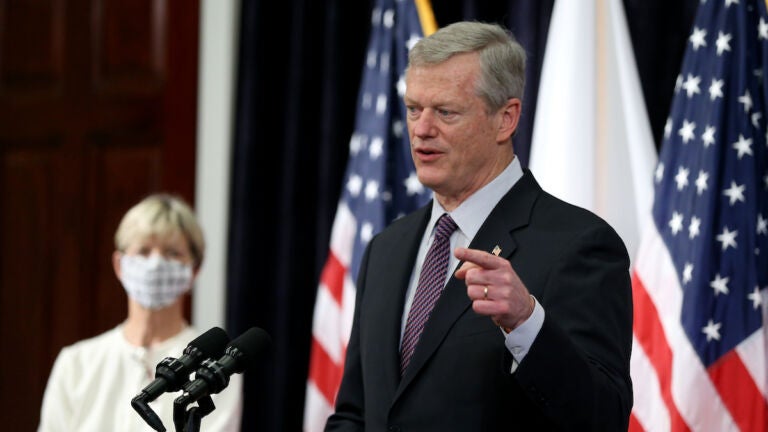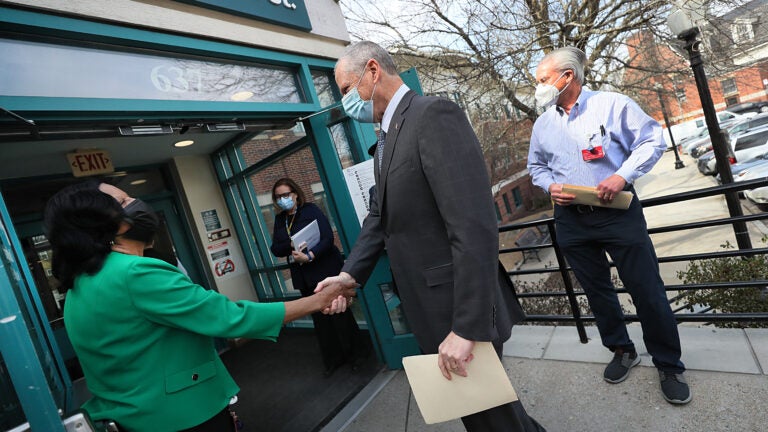[ad_1]
Health
“These changes … would be dramatic relative to the way this system operates pretty much anywhere else in the country.”

-

Gov. Baker: Bill would expand mental health care services
Too often, those seeking health care, particularly for mental health, end up in emergency rooms across Massachusetts — a last resort of sorts that’s indicative of underfunded services and, among other issues, is “enormously expensive,” Gov. Charlie Baker says.
“If we were proactively putting more resources into expanding and improving the comprehensiveness of our primary care and behavioral health delivery system, we would have a lot fewer people in the E.R. with no place to go,” Baker told the Legislature’s Joint Committee on Health Care Financing on Monday.
The dilemma was part of Baker’s pitch to lawmakers that his “Act Investing in the Future of Our Health” is necessary to modernize the state’s health care system, particularly by increasing investments in and access to primary care and behavioral health care.
Filed last month, the bill includes several aspects Baker, a former health care executive, first proposed in 2019. But the proposal also includes several new provisions based on “lessons learned” since the onset of the COVID-19 pandemic over two years ago, he said.
The health crisis shone a light on the system’s underlying and longstanding challenges, such as access to services “that keep people healthy over time,” said Baker, who served as CEO of Harvard Pilgrim Health Care before taking office.
A key component of the bill calls on insurers and providers to spend more on primary care and behavioral health services. Baker is looking to set a target for those industry players to spend 30 percent more than they did in 2019 by the end of 2024 — an estimated $1.4 billion increase, according to the governor.
“Our healthcare system rewards those providers that invest in technology and transactional specialty services at the expense of those who choose to invest in primary care, geriatrics, addiction services, and behavioral health,” Baker said in prepared remarks. “Simply put, the care delivery and financing system we have today that was built on the Medicare fee schedule, which was developed 50 years ago, is not designed to take care of the people and the patients we’ve become and our health care needs in the future.”
Providers and payers build their financial models around the Medicare schedule as a baseline, which in turn makes deviating from that system difficult when one may want to expand a given service, Baker said.
Baker’s spending target is intended to “reorient the way insurers and health care providers invest in these services,” he said. The legislation outlines what the governor described as “positive” incentives, with built-in flexibility for insurance companies and providers to determine how they meet that goal.
In response to a question about cost controls in the bill, Baker described his vision as systemic reform.
“I would argue that these changes that we’re proposing, which would be dramatic relative to the way this system operates pretty much anywhere else in the country, would have real positive consequences on both care delivery, patient satisfaction, and cost,” Baker said.
Later in his testimony, Baker pointed to the success of European countries, where lawmakers invest heavily in primary and mental health care. Those nations, unlike the United States, do not see “so many people struggling to manage their way through complex medical conditions,” he said.
“If we just sort of tinker around the margins and say we want a little less of this or a little more of that and don’t go hard at the things that we’ve been under investing in for a really long time, we are unlikely to get the change in the cost curve and a patient satisfaction that you guys are talking about,” he told lawmakers.
The bill aims to lower the amount of out-of-pocket payments for patients, and also places an emphasis on lowering health care costs in several other ways.
If passed, the law would set penalties for excessive drug price increases while also creating a new oversight authority for pharmacy benefit managers, the “middlemen” of the pharmaceutical industry.
State Health and Humans Services Secretary Marylou Sudders said the bill would additional. ly reign in costs typically covered by patients through creating a default payment rate for reimbursement that carriers must pay to out-of-network providers for unforeseen services.
“This will protect consumers from unforeseen medical bills, while also ensuring providers are adequately compensated,” Sudders said, in testimony alongside Baker on Monday. “Most importantly, it takes the consumers out of the middle of a dispute between a health care provider and payer.”
Baker and Sudders said the bill seeks to improve access to “high-quality” care, including modernizing licensure and practice standards for certain professionals. The bill also would remove location limits on telemedicine or virtual appointments for providers that follow federal and state licensing requirements, among other reforms.
As Baker noted Monday, the bill includes components already present in several bills now working their way through the Legislature.
The governor, however, made clear his eagerness to act on health care reform by the end of the current legislative session in July.
“It’s good to see that even though we don’t always make it to the finish line, good ideas stick around,” said state Sen. Cindy Friedman, an Arlington Democrat and Senate chair of the joint committee. “And, you know, there’s a lot of things in this bill that certainly I can speak for the Senate to say, ‘Yep, we agree.’”
The 30 percent spending increase proposed by Baker is something Friedman said she “wholeheartedly” supports.
“I think one of the things that we’re going to be looking at is where in this bill, how do we get to those dollars that are going in one place now and really need to go into another without increasing the total cost of health care,” Friedman said. “I think that’s the concern.”
Baker, asked to name one element of the bill he would consider a true game changer for the commonwealth, said he cares “deeply about flipping the paradigm on the fee schedule.”
“It’s probably the hardest to implement, which I apologize for,” Baker said.
“Doesn’t make it not worth it,” Friedman replied.
Baker chimed back: “Absolutely.”
Newsletter Signup
Stay up to date on all the latest news from Boston.com
[ad_2]
Source link
